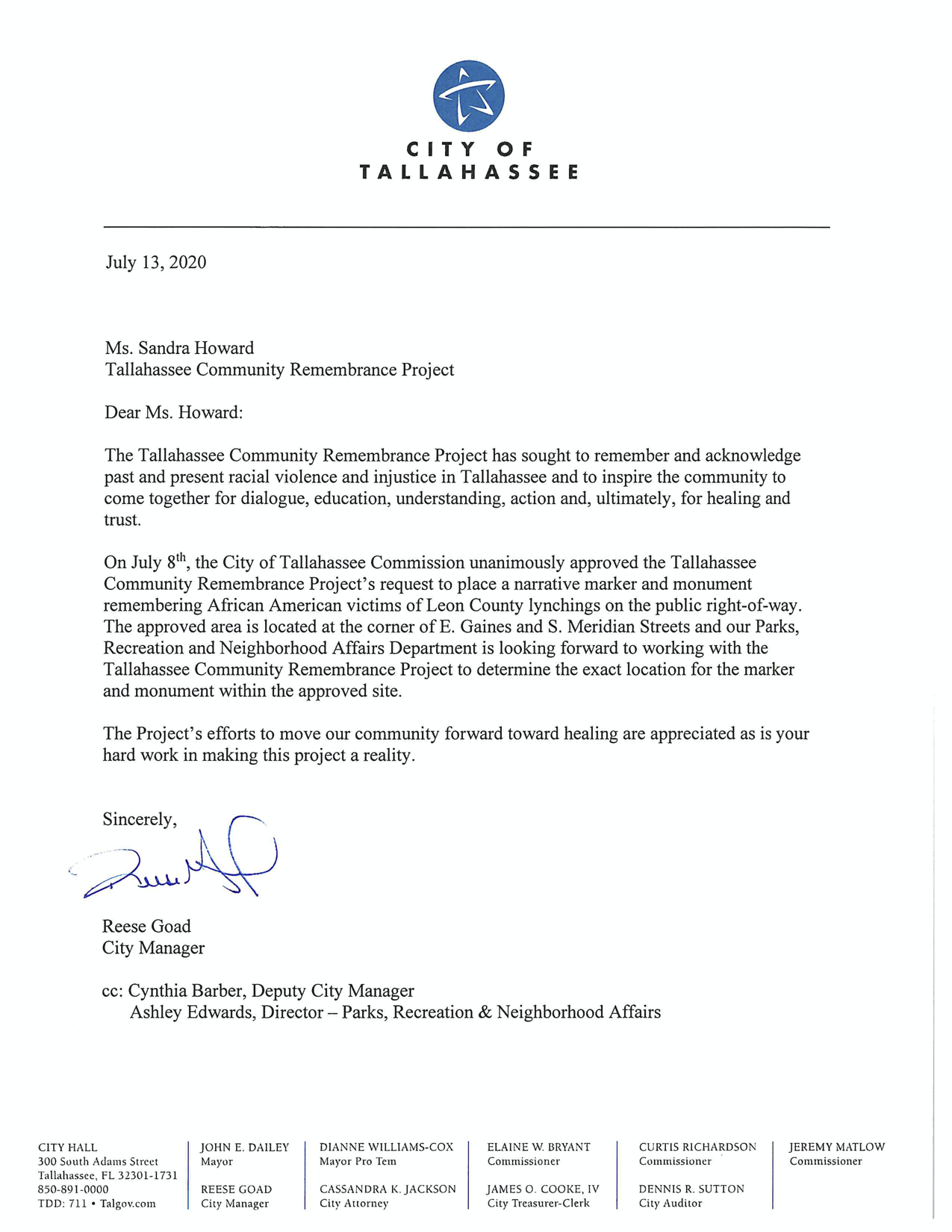Below is a copy of the report submitted to the Tallahassee City Commission at the July 8, 2020 meeting by members of the Tallahassee Community Remembrance Project Steering Committee, including images of the specifications for the proposed narrative marker and an example of a similar narrative marker:
Over the past two and a half years, a coalition of 33 Tallahassee community partners from diverse congregations and organizations has sought to remember and acknowledge past and present racial violence and injustice in Tallahassee and to inspire our community to come together for dialogue, education, understanding, action and, ultimately, for healing and trust.
Our research, corroborated by the Equal Justice Initiative in Montgomery, Alabama, indicates that Florida was the site of at least 331 lynchings between 1877 and 1950. Four of those lynchings
took place in Leon County: Pierce Taylor (1897), Mick Morris (1909), Richard Hawkins (1937), and Ernest Ponder (1937). Multiple documents and historical records confirm that these four men were taken and lynched from two Leon County jails located on the south side of Gaines Street between Meridian and Gadsden Streets.
The Equal Justice Initiative has approved the Tallahassee marker’s narrative text, drafted by members of our coalition, and will assist this project by paying costs related to marker production and shipping, by arranging materials and funding for a public high school essay scholarship competition and awards, and by shipping materials to participating schools.
On February 29, 2020, over 100 people gathered near Cascades Park to shovel soil from the site of the former Leon County jails and fill eight jars, four for public exhibit at the National Memorial for Peace and Justice in Montgomery, Alabama and the remaining four for display here in Tallahassee. We are honored to work alongside the Equal Justice Initiative to take on the challenging, necessary work of telling the truth about our
history and building a future rooted in justice.
Many other cities have already erected narrative markers such as the one that we propose:
in front of the Orange County Regional History Center in Orlando, FL
at Whitmore Park in Annapolis, MD
in the town square of Abbeville, SC
in front of the old jail in Tuscaloosa, AL
at the foot of the Edmund Pettus Bridge in Selma, AL
at a park in downtown Nashville, TN
and in more than a dozen additional cities.
The Community Remembrance Project requests that the Tallahassee City Commission approve placement of the narrative marker on the public right-of-way at the corner of E. Gaines and S. Meridian Streets in the same location near the large oak tree where the Community Remembrance Project hosted the soil collection in February. The Equal Justice Initiative has informed us that it will take approximately ten to twelve weeks for the marker to be constructed and shipped after the City provides the letter granting permission for the marker’s location. Community Remembrance Project partners will host a culturally relevant dedication and unveiling ceremony for the marker.
The Community Remembrance Project also plans to erect the duplicate Leon County Monument, currently held at the National Memorial for Peace and Justice in Montgomery, at the same location as the narrative marker. We request the City Commission’s approval to erect that monument at a later date, to be determined with assistance from the Equal Justice Initiative and in collaboration with local architectural and design firms.






